Note: This post is not a call to reject hadīth literature in its entirety, but rather an invitation to approach it with critical scrutiny and historical awareness. I will present the views of both contemporary Islamic and academic scholars later. For now, the following points highlight serious concerns raised by respected Sunni voices regarding two of the most prominent hadīth compilers.
- Imam al-Bukhārī Deleted and Altered Hadīths
The renowned Sunni hadīth scholar Shaykh al-Hadīth Habībullāh Dervī (d. 1428 AH) openly acknowledges that Imām al-Bukhārī made unjustified alterations to hadīth texts:
"Imām al-Bukhārīs deletion of Zayd ibn Thābit's narration and alteration of that hadīth was an unjustifiable action." (101)
- Imam al-Bukhārī Deliberately Distorted Narrations
Shaykh Dervī further accuses Imām al-Bukhārī of manipulating the words of individuals he viewed as personal or theological opponents:
"Mā shā Allāh! Imām al-Bukhārī was very skilled at deleting and altering the statements of his rivals." (83)
- Imam al-Tirmidhī Corrupted Doctrinal Foundations
According to Shaykh Dervī, Imām al-Tirmidhïs hadīth compilation had a corrupting influence on Sunni theology. He claims that respected Sunni scholars were misled or harmed through their reliance on al-Tirmidhï's work:
"Imām al-Tirmidhī corrupted the doctrines of Sunnī Imāms through his hadīths. This even resulted in a respected scholar such as Shaykh al-Aynī losing his reputation due to reliance on Imām al-Tirmidhīs 'şahīh' collection." (23)

- Imam al-Bukhārī's Silence on the Accuracy of His Hadīth Recordings
The eminent Shāfiī muhaddith Imām al-Khațīb al-Baghdādī (d. 463 AH) narrates an incident in which Imām al-Bukhārī was questioned about the accuracy of his hadīth recordings. Al-Bukhārī boasted that he would only write down hadīths after traveling to another region to verify them. However, when asked directly whether he had written them down in full or accurately, he gave no answer:
"Al-Bukhārī said: 'There may be a hadīth I heard in Basrah but which I later wrote down in Syria; and there may be a hadīth I heard in Syria but which I later wrote down in Egypt.' He was asked: 'O Abū 'Abd Allāh, did you write the hadīths completely?' He remained silent."

- Ibn Hajar al-'Asqalānī Reports al-Bukhārī's Uncertainty and Reliance on Memory
The great Shāfiī Sunni muhaddith and Shaykh al-Islām, Imām Ibn Hajar al-'Asqalānī (d. 852 AH), documents two more incidents that raise concerns about Imām al-Bukhārī's recording methods and his reliance on memory rather than immediate transcription. In the first report, the governor of Bukhara recounts a conversation with al-Bukhārī that mirrors the earlier incident noted by al-Khațīb al-Baghdādī:
“Muhammad ibn Ismāīl [al-Bukhārī] said to me: 'There may be a hadīth I heard in Başrah but which I later wrote down in Syria; and there may be a hadīth I heard in Syria but which I later wrote down in Egypt!' I asked him: 'O Abū 'Abd Allāh, did you write the hadīths completely?' He remained silent." (201)
In the second incident, a firsthand witness observed al-Bukhārī attending a scholarly gathering, listening to hadīths without writing anything down. When asked why, someone replied:
"When he [i.e. al-Bukhārī] returns to Bukhara, he'll write down from his memory what he heard!" (194)

- Al-Bukhārī Reported Contradictory Versions of Hadīths Under a Single Isnād
Shaykh al-Islām Ibn Hajar al-'Asqalānī points out a strange and troubling habit in al-Bukhārīs methodology. He notes that al-Bukhārī would sometimes report two different versions of a hadīth under a single chain of narration (isnād):
“What is unusual about al-Bukhārī is that he would fully report the hadīth with a single isnad, but give two [different] versions [of that hadīth]!"


- A Sunni Faqīh Warned That Reading Sahih al-Bukhārī Could Lead to Apostasy
A striking statement is reported by the eminent Sunni hadith master, Shaykh al-Islām Ibn Hajar al-'Asqalānī (d. 852 AH), in his historical chronicle Inba al-Ghumar. He records that a respected Hanafī jurist, Shaykh al-Multī al-Hanafī (d. 803 AH), issued a severe warning regarding Şahih al-Bukhārī.
"He [Shaykh al-Multī al-Hanafi] said: 'Whoever reads Şahih al-Bukhārī will become a heretic."

- Sunni Ulema Accused Imām al-Bukhārī of Hadīth Corruption (Tadlīs)
One of the most serious charges against Imām al-Bukhārī comes from within the Sunni tradition itself. The eminent Sunni muhaddith and Shaykh al-Islām, Ibn Hajar al-'Asqalānī (d. 852 AH), documents in his work Tabaqāt al-Mudallisīn that another major hadith master, Imām Abū 'Abd Allāh ibn Mundah, explicitly accused al-Bukhārī of practicing tadlīs-a form of hadīth manipulation in which transmitters obscure or hide the actual source of a narration:
“Imām Abū 'Abd Allāh ibn Mundah accused Imām al-Bukhārī of tadlīs, saying: 'Imām al-Bukhārī would say "fulān (so-and-so) said this" and "fulān said that." This was tadlīs by Imām al-Bukhārī.' But Ibn Mundah didn't stop there. What's clear is that Imām al-Bukhārī himself admitted the following: he reported hadīths he did not personally hear; or hadīths he deemed didn't meet his personal criteria; or he narrated mawqūf reports (statements of Companions) as if they were marfű (Prophetic), saying 'he said to me' or 'they said to
us'. I came to know this by reading his book."

- More Sunni Scholars Accuse Imām al-Bukhārī of Hadīth Corruption Through Tadlīs
The accusations of hadīth manipulation against Imām al-Bukhārī were not isolated to Ibn Mundah. Another towering Sunni authority, the renowned muhaddith and historian Imām al-Dhahabī (d. 732 AH), also explicitly charged al-Bukhārī with committing tadlīs-the concealment of transmission gaps or the use of ambiguous phrasing that compromises isnād reliability.
In his biographical compendium Mīzān al-/tidāl, Imām al-Dhahabī states bluntly:

Imām al-Bukhārī frequently practiced tadlīs."
In another of his seminal works, Siyar A'lām al-Nubala, al-Dhahabī reaffirms this criticism, stating:

"No doubt, Imām al-Bukhārī narrated from him in his Şahīḥ. But he [i.e., al-Bukhārī] practiced tadlīs."
It is common to hear the claim that Şahīh al-Bukhārī is the most authentic book on earth after the Qur'ān, and that for it to contain even a single daïf (weak) hadīth is impossible. However, this perception will be challenged here. I will also cite academic scholarship to support the argument later. The case in question revolves around a narrator named 'Ikrimah. Many people assume that the primary reason for rejecting him is his affiliation with the Khārijite sect, but in reality, his weaknesses extend beyond that, particularly according to the principles of 'Ilm al-Rijāl as understood by scholars, including the Hanafīs. First, this 'Ikrimah is not the son of Abū Jahl, but rather the tābiī 'Ikrimah ibn 'Abd Allāh al-Madanī, who died in 105 AH. There are multiple defects attributed to him, which cast serious doubt
on his reliability as a transmitter of hadīth:
-
Accusations of lying, reported by several contemporaries, including Ibn Sīrīn, Saīd ibn al-Musayyab, Saīd ibn Jubayr, and 'Alī, the son of Ibn 'Abbās.
-
He reportedly moved between royal households asking for money.
-
He was known to use coarse or indecent language.
-
He exhibited an obsessive tendency toward declaring others disbelievers (takfīr).
-
He was accused of harboring violent inclinations, including a willingness to kill fellow Muslims.
-
He reportedly did not perform prayers, as stated by his own student, Ayyūb al-Sakhtiyānī.
These are not minor criticisms, and his inclusion in Şahīh al-Bukhārī does not exempt him from scrutiny. Al-Bukhārī, while a towering scholar, was not infallible. Some reported details further illustrating his unreliability include:
- He allegedly used vulgar terms like "shit" in response to questions about hadīth and legal matters-an unusual precedent among transmitters of knowledge.
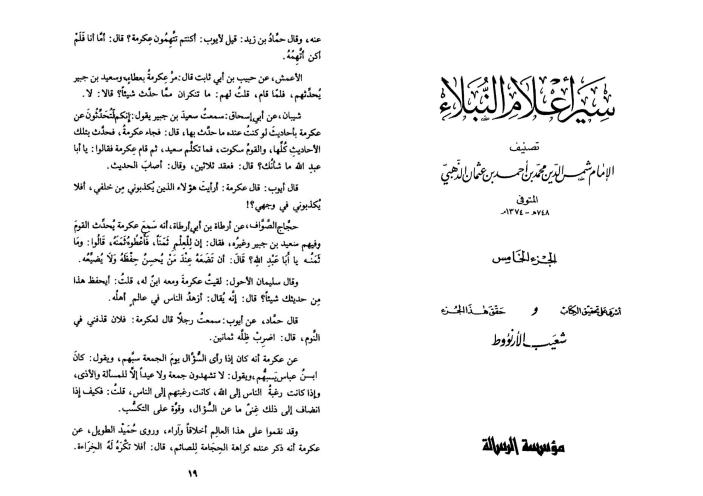
- Ibn 'Abbās reportedly called him khabīth (vile or corrupt), and it is confirmed that he propagated the Safarī branch of the Khārijites.
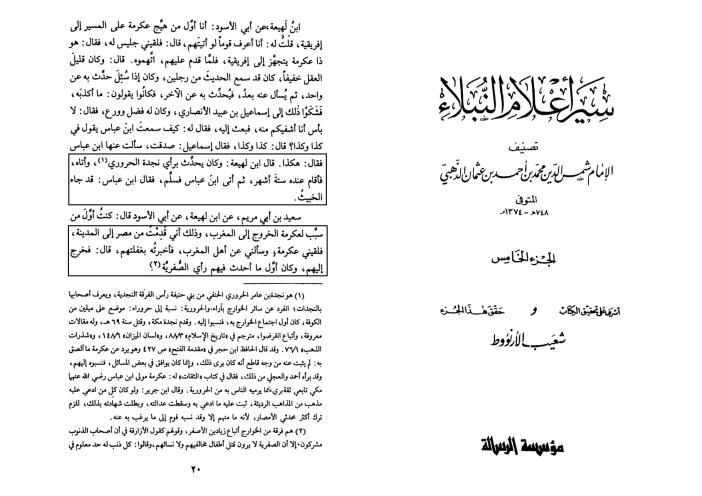
- Imām Ahmad ibn Hanbal stated that 'Ikrimah used to frequent the courts of princes to ask for financial assistance and reaffirmed his sectarian affiliation.

- Saīd ibn al-Musayyab is reported to have said that 'Ikrimah wanted to go on Hajj with a spear in hand to kill people around him. He also said that 'Ikrimah fabricated narrations in the name of Ibn 'Abbās.
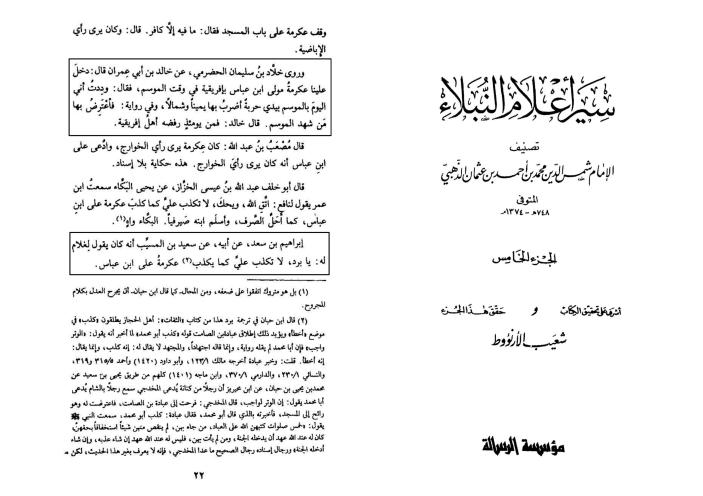
- 'Alī ibn 'Abd Allāh ibn 'Abbās also confirmed 'Ikrimah's tendency to fabricate narrations on behalf of his father.

- Saīd ibn Jubayr similarly accused 'Ikrimah of fabrication. Both he and Saīd ibn al-Musayyab lived in the same region and time period as 'Ikrimah, so they were well acquainted with him.
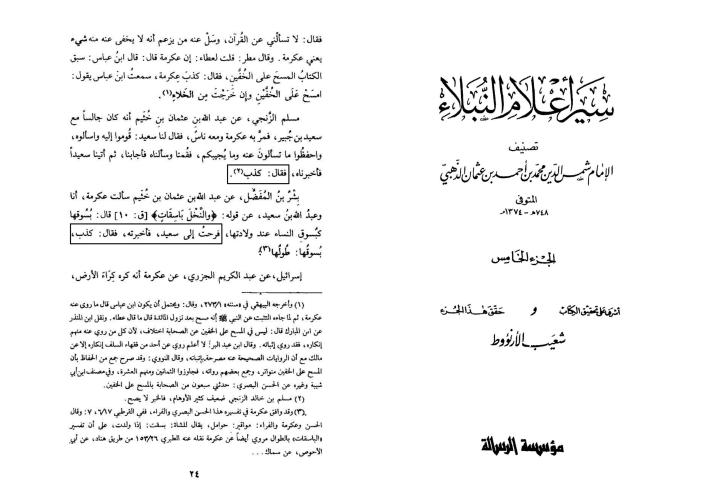
- Ibn Sīrīn called him a kadhdhāb (liar). Yahyā ibn Saīd also confirmed this accusation. Ibn Abī Dhib said, I saw 'Ikrimah, and he was not thiqah (trustworthy).
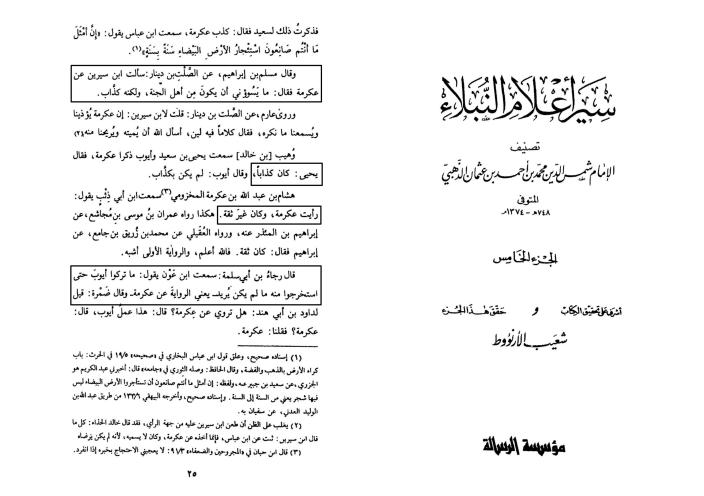
- Imām Mālik explicitly rejected 'Ikrimah's narrations, stating it is impermissible to accept his hadīth. Mālik personally knew and saw him. Ahmad also described his narrations as mudțarib (inconsistent or contradictory).
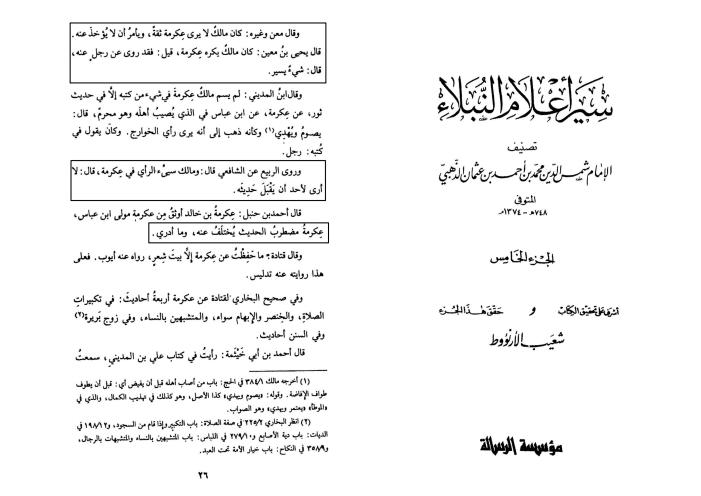
- Ayyūb confirmed that 'Ikrimah did not pray. Other accounts describe him as mentally deficient, a beggar, and someone who traveled to Samarkand to collect money from royalty.

- 'Ikrimah himself admitted that he only accepted money from princes.

- In one instance, he fabricated a story and attributed it to Ibn 'Abbās. When people admired the story, he reportedly confessed, "I made it up."

We have established that 'Ikrimah is a severely weak narrator, and the majority of scholars have cast doubt on his reliability. Despite this, Imām al-Bukhārī makes a questionable claim:
*"There is no one among our companions except that he uses 'Ikrimah as proof. Al-Nasāī said: He is trustworthy." (*Tahdhīb al-Kamāl fī Asmā al-Rijāl 20/289)
And, al-Bukhārī himself relies heavily on 'Ikrimah in his Şahīh. As noted:
"A group declared him trustworthy, and al-Bukhārī relied on him. As for Muslim, he avoided him and narrated from him only in conjunction with others. Mālik also avoided him and only narrated from him in one or two hadīths." (Mīzān al-Itidāl fī Naqd al-Rijāl 3/93)
Not only did al-Bukhārī overlook the overwhelming scholarly consensus on 'Ikrimah's weakness, but he also made an inaccurate generalization by claiming that "all" of his peers accepted 'Ikrimah as reliable when that is not the case.
BukhariGate Part 1: Sahih Bukhari is NOT so Sahih -Mufti Abu Layth |
https://youtu.be/X6SfFYRljeY2kv93MLs8Nlaiwm6
BukhariGate Part 2: Sahih Bukhari is NOT so Sahih -Mufti Abu Layth |
https://youtu.be/lijbMTxUEOw
Are Sahih Bukhari & Muslim 100% Authentic? Dr. Shabir Ally answers | https://youtu.be/-DB_mxLqLgc WEpqS0dLRUhM2OHU
Ending Over-Reliance on Hadith | Shaykh Atabek Shukurov |
https://youtu.be/Mb2MOsjzetQ
The Rise of Hadith Forgery | Dr. Shabir Ally | https://youtu.be/7RnJ0iZZVYw iUnrPDNGYR6alIFS
Problems Arising from Weak or False Hadiths | Dr. Shabir Ally |
https://youtu.be/bnCQqTVKvu0
Oxford Scholar Dr. Joshua Little Gives 21 REASONS Why Historians are SKEPTICAL of Hadith | https://youtu.be/Bz4vMUUxhagYtfYlwPIVSSoRXx3
21 Reasons Historians are Skeptical of Hadith (Review) |
https://youtu.be/V511ekpifQ0
Dr. Jonathan AC Brown - Q&A: Is Sahih Bukhari 100% Correct? (Only 3-4 hadith are disputed) |
https://youtu.be/m15MhaYuLEwRH2JG8EMal6k4M1W
Kitāb Tabaqāt al-Mu'tazila -
https://archive.org/details/tabaqat-moatazila/page/n14/mode/1up
Some contradictions in Sahih Bukhari and Sahih Muslim refuting the baseless excuse by some scholars that no further work needs to be done on Hadith - https://asimiqbal2nd.wordpress.com/wp-content /uploads/2009/06/contradictions.pdf
A Collection of Scientific Criticism on Sahih al-Bukhari -
https://www.diwan.com.af/en/a-collection-of
-scientific-criticism-on-sahih-al-bukhari/
Criticism of Hadith -
https://www.irfi.org/articles3/articles_4701_4800 /criticism%20of%20hadithhtml.htm
Appendix 19 by The Final Testament, by Rashad Khalifa, PhD
https://www.masjidtucson.org/quran/appendices /appendix19.html
Hadith & Sunnah are satanic innovations that are not from the Prophet -
https://www.masjidtucson.org/submission /perspectives/hadith/
STONING FOR ADULTERY: CONTRADICTIONS AND CONFUSIONS GALORE IN THE AHADITH -
https://www.irfi.org/articles/articles_51_100 /stoning_for_adultery.htm
WHICH HADITH DO YOU BELIEVE? -
https://www.irfi.org/articles/articles_151_200/which _hadith_do_you_believe.htm
52 Weak Ahadith
https://www.irfi.org/articles/articles_251_300/52 weak_ahadith.htm
Research: 8000 Female Hadith Scholars - https://www.irfi.org/articles/articles_1051_1100 /research_8000_female_hadith_scholars.htm
Not Acting Upon a Hadith: Any Excuses? -
https://www.irfi.org/articles/articles_1301_1350/not _acting_upon_a_hadith.htm
BUKHARI AND EARLY HADITH CRITICISM -
https://go.gale.com/ps/i.do?id=GALE
%7CA78131769&sid=googleScholar&v=2.1&it=r& linkaccess=abs&issn=00030279&p=AONE&sw=w& userGroupName=anon%7E69d46cb5&aty=open-web -entry
A Summary of Early Sunni Hadith Criticism - https://islamicorigins.com/a-summary-of-early -sunni-hadith-criticism/
How reliable are Hadith? Some are contradictory. - https://www.mohammedamin.com/Community _issues/How-reliable-are-hadith.html
Review of "A Textbook of Hadith Studies: Authenticity, Compilation, Classification and Criticism of Hadith" by Mohammad Hashim Kamali - https://www.mohammedamin.com/Reviews/A -Textbook-of-Hadith-Studies.html
Review of "Authentication of Hadith - Redefining the Criteria" by Israr Ahmad Khan -
https://www.mohammedamin.com/Reviews
/Authentication-of-Hadith-Redefining-the-Criteria
.html
Hadith of 73 sects Analyzed by Shaykh Salah al-Din bin Ahmad al-Idlibi -
https://primaquran.com/2024/01/12/hadith-of-73 -sects-analyzed-by-shaykh-salah-al-din-bin-ahmad-al -idlibi/
Shaykh Muhammad bin Yahya al-Husayni al-Ninowy: "Hadith on 73 sects is fabricated." -
https://primaquran.com/2024/01/12/shaykh
-muhammad-bin-yahya-al-husayni-al-ninowy-view-on-the-hadith-on-73-sects/
The Nature and Role of Hadith: An Analysis of a Re-evaluation -
https://www.irfi.org/articles/articles_301_350 /nature_and_role_of_hadith.htm
"How can we be sure that we have the actual uttering of the Prophet?" Dr. Jonathan Brown responds.... "You can't!" -
https://web.archive.org/web/20220627234848 /https://primaquran.com/2018/08/08/how-can-we -be-sure-that-we-have-the-actual-uttering-of-the -prophet-dr-jonathan-brown-responds-you-cant/
My position on the hadith -
https://primaquran.com/my-position-on-the-hadith/
Does the Qur'an instruct us to disregard all hadith ? - https://primaquran.com/2022/10/05/does-the -quran-instruct-us-to-disregard-all-hadith/
Salafi Shaykh Nasiruddin al-Albani admits: Bukhari has weak hadith and mistakes! -
https://primaquran.com/2022/10/05/salafi-shaykh -al-abani-admits-of-course-bukhari-has-weak-hadith -and-mistakes/
Sunni intellectual giant: Ibn Hajar Al Asqlani questions hadith about 90 foot tall Adam. -
https://primaquran.com/2022/10/04/ibn-hajar-al
-asqalani-questions-hadith-about-90-foot-tall-adam/
Textual Manipulation of Hadith To Advocate Prayer Positions. -
https://primaquran.com/2022/10/04/textual
-manipulation-of-hadith-to-advocate-prayer-positions/
Did Imam Al Bukhari reject 99% of the hadith he came into contact with? -
https://primaquran.com/2022/10/04/did-imam -bukhari-reject-99-percent-of-the-hadith-that-he -came-into-contact-with/
Al-Daraqutni: The Sunni Imam who questioned Bukhari's collection
https://web.archive.org/web/20210727062106 /https://primaquran.com/2017/11/08/al-daraqutni -the-sunni-imam-who-questioned-bukharis-collection/
Attacks upon Sahih hadith by Sufi Leaning Ashari Theologians -
https://primaquran.com/2022/10/04/attacks-upon
-sahih-hadith-by-ashari-theologians/
Hadith Narrators and Infallible Memories? - https://web.archive.org/web/20201031075402 /https://primaquran.com/2020/07/24/hadith -narrators-and-infallible-memories/
The man who could steal with ease....according to this hadith! -
https://web.archive.org/web/20220628205457 /https://primaquran.com/2019/12/07/the-man-who -could-steal-with-ease-according-to-this-hadith/
The hadith of the 73 sects in light of the Qur'an. - https://primaquran.com/2024/01/12/hadith-of-the -73-sects-in-light-of-the-quran/
Shaykh Hamza Yusuf "We only have 500 hadith that are of the status of the Qur'an!" -
https://web.archive.org/web/20220628213931 /https://primaquran.com/2016/12/29/shaykh -hamza-yusuf-we-only-have-500-hadith-that-are-of -the-status-of-the-quran/
Complete Salah (Prayer) based only on Sahih hadith impossible! -
https://primaquran.com/2022/10/04/complete
-salah-prayer-based-only-on-sahih-hadith-impossible/
A manuscript of the Musnad of Imam Rabe' bin Habeeb that was found. -
https://primaquran.com/2022/10/04/a-manuscript-of-the-musnad-of-imam-rabe-bin-habeeb-that-was -found/
https://quranandbibleblog.com/new-page-hadith -database-problematic-ahadith-and-their-explanation/